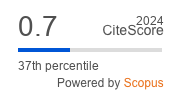Role of Multi-Detector CT Angiography in Assesmente of Athrosclerotic Coronary Artery Disease
DOI:
https://doi.org/10.47723/kcmj.v15i2.159Keywords:
Coronary artery disease (CAD), multidetector computed tomography (MDCT)Abstract
Background: Imaging has a critical role in the diagnosis and evaluation of cardiac diseases, beginning with chest radiography and fluoro-scopy and progressing to coronary angio-graphy, echocardiography, nuclear medicine and recently multidetector computed tomo-graphy (MDCT) as well as magnetic resonance (MR) imaging
Objective: To highlight the role of Multi-detector CT in the evaluation of coronary artery disease and its importance of being noninvasive diagnostic technique.
Methods: A cross sectional study for 20 patients. Patients were asked to fast 6 hours prior to the examination and the patients with heart rates above 65 beats per minute were given cardio-selective beta-blocker and for heart rate above 75 (up to 85) beat/min, the best systole phase was used for reconstructing our images
Results: for Evaluation of native coronary arteries, the CTCA showed significant lesions (occlusion or >60 % stenosis) in the native arteries of 13 patients and insignificant lesions in 7 patients.
Evaluation of CABG (8 arterial grafts); for (LIMA) graft, 83% were patented, and 17% were narrowed and 100 % of (radial graft) were patent. For Venous Grafts the study included 10 venous grafts; 70 % were patent, 20% were narrowed and 10 % were totally occluded.
Conclusion: The multi-slice CTCA is now a clinically reliable noninvasive tool that allows the evaluation of the native coronary arteries, the bypass grafts, coronary stents.













